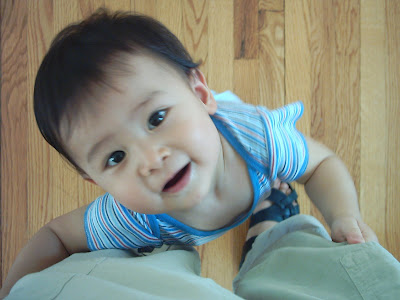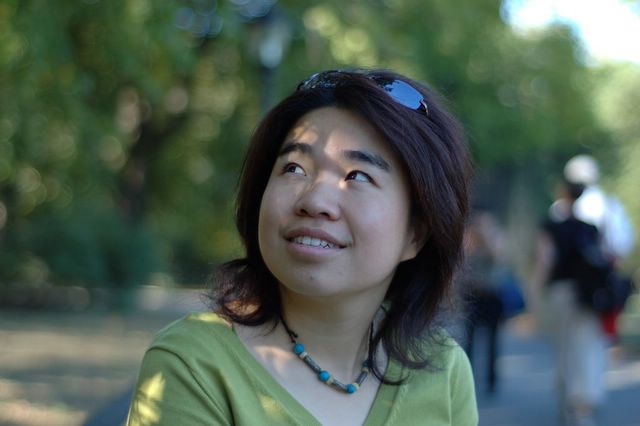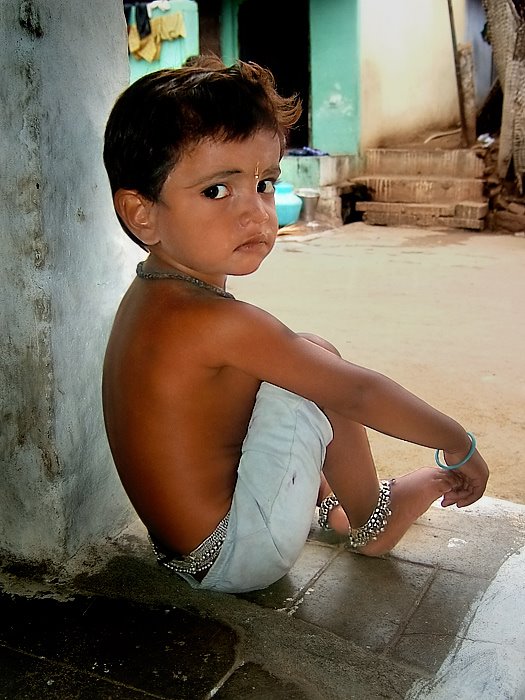
2007年4月14日星期六
People mountain people sea

2007年4月9日星期一
On the Edge: New Independent Cinema from China
 Locations of Screenings:Columbia University: Roone Arledge Auditorium, Alfred Lerner Hall (in bold, below) The Film Society of Lincoln Center: Walter Reade Theater
Locations of Screenings:Columbia University: Roone Arledge Auditorium, Alfred Lerner Hall (in bold, below) The Film Society of Lincoln Center: Walter Reade Theater
2007年4月8日星期日
两个“世界中心以外”的人写父亲
两个“世界中心以外”的人写父亲
老颓
先是在放老的博客上看到阿城写他的父亲,
又看到土耳其的帕慕克得奖时候的演说,也是写他父亲。
按照帕慕克的说法,这俩都在“世界中心之外”,
两人的用心处还真不太一样,挺有意思的。
转贴如下——
要说明的是,帕慕克的部分是选译,全文找不到电子版,
今年第二期的《世界文学》杂志上有,邓中良、缪辉霞译。\\\
父亲的手提箱(帕慕克)
父亲去世前两年,给我一只小提箱,里面装着他的作品、手稿和笔记本。他用一贯的玩笑、嘲弄的口气对我说,他希望我在他走之后———也就是他死之后再把这些东西拿出来阅读。
“你只要看看”。他表情有点窘迫地说,“看看里面有没有你能用得上的东西。也许我死之后,你可以从中挑选出一些来发表。”
那 时我们在书房里———那里是书的海洋。父亲像一个渴望摆脱令人厌烦的负担的人一样,在房间里走来走去,想找一个地方放手提箱,最后他把它轻轻放在一个不显 眼的角落里。我们一定都不会忘记那一刻的不自在。但是事过境迁,我们又回到了往常的生活中,心情轻松地生活着,老是互相开玩笑,嘲笑对方,都很轻松。我们 像以前一样交谈,谈日常生活的细枝末节,谈土耳其无休无止的政治动乱,谈父亲总是失败的买卖事业,没有感到很悲伤。
记 得在父亲离开后的好几天里,我走来走去,总是要经过提箱,但我一次也没有碰它。这个小小的手提箱,于我已经不陌生了。我熟悉它的锁和圆形边角。父亲短途旅 行时总是带着它,有时候上班还用它来装文件。记得小的时候,每次父亲旅行归来,我总要打开这个小提箱,翻他的东西,闻闻里面的古龙香水的气味,看看那些具 有异国风情的东西。这个小提箱是我熟识的朋友,看着它很容易让我想起童年,想起过去,但现在我甚至不能触摸它。这是为什么呢?毫无疑问,是因为里面所装东 西的神秘的分量。
我抚摸着父亲的提箱,却无法促使自己去把它打开,但我知道一些笔记本里写了什么。我曾经看到父亲在其中的几本上面写过东西。我不是第一次听说小提箱沉重的分量。父亲有一个很大的书房。他年轻时,也就是20世纪40年 代末,曾经想成为一位伊斯坦布尔诗人,还把瓦莱里的作品翻译成了土耳其语。但他不愿意过那种生活———在一个贫穷的国家写诗,却几乎没有读者来欣赏。父亲 的父亲———我的祖父———是一个富有的生意人;父亲小时候和年轻的时候过着舒坦的生活,他不想为了文学,为了写作忍受各种苦难。
作 家就是这样一种人———他们成年累月,很有耐心地努力发掘自己身上存在着的第二个人和造就了他们的这个世界:当我说起写作,脑海里首先想到的不是小说、诗 歌和其他文学样式,而是一个人,把自己关在房间里,独自坐在书桌前,在自我反省;在房间的背光处,他用文字创造出了一个新世界。写作就是一个人完全让自己 归隐,并耐心、执著地研究人们进入的世界,把内心的自省转化为文字。当我日复一日、成年累月地坐在书桌前,慢慢地把新的文字写到空白的纸上,我感觉自己似 乎在创造一个新的世界,似乎在变成我心里的另外一个人。然而一些人以同样的方式,用一块块石头会建造出一座桥梁,一个穹顶。我们这些作家用的“石头”是文 字。如果我们把这些“石头”握在手心里,思考它们之间的关联方式,一会儿在远处观察,一会儿用手指或笔尖“抚摸”它们,进行斟酌,调换顺序,耐心而又充满 希望地不断坚持,我们就会创造出一个新世界。
父亲有一个相当大的书库,总计约1500册书,而这对于一个作家来说已经很多了。我22岁时,也许还没有把它们都看一遍,但我对每本书都很熟悉———我知道哪些书很重要,哪些不重要但却简单易读,哪些是古典文学,哪些书对教育来说至关重要,哪些书是对当地历史的易被忘记却逗笑的描述,父亲对哪些法国作家评价很高。
我 觉得父亲读小说是为了逃避生活,逃往西方———这跟我后来的做法一样。或者在那些日子里,书是我们随手拿起的、又可以让我们脱离自己文化的东西。我们发现 自己的文化是不够完整的。我们不只是通过阅读离开伊斯坦布尔的生活,去西方旅游———也可以通过写作来实现。父亲去了巴黎,把自己关在房间里,在那些笔记 本上写东西,然后把他的作品带回土耳其。
事 实上,我生父亲的气,是因为他没有过像我一样地生活,因为他从来没有跟生活吵架。他的生活是成天快乐地和朋友、亲人一起欢笑。但是我部分地知道,我也可以 说,与其是“生气”倒不如说是“嫉妒”;“嫉妒”这个词也更为准确;而这也让我不安。我用一贯的轻蔑、生气的语气问自己:什么是快乐?快乐的人会想到我在 那个单独的房间过着别人难以理解的生活吗?快乐就是在社会上过着舒适的生活,像其他所有人一样相信同样的东西,或者像你一样采取行动?秘密地进行写作来度 过人生———同时让人看起来似乎与周围的一切相协调———这是幸福或是不幸福呢?但这些都是会让人发怒的问题。我是从何处得到这个想法:美好生活的标准是 快乐?光凭这一点可以证明:如果对立面是对的,我们会努力去发现这个事实吗?毕竟,父亲从家里出走了很多次———我了解他多少呢,怎么能够说我理解他的不 安呢?
一 打开这个提箱,我就看出它旅游过的迹象、认出了几本笔记本,并注意到父亲几年前曾经把它们拿给我看过,但没有花长时间详细说明。我现在拿在手里的笔记本中 的大部分,都是他年轻时离开我们去巴黎的时候写的。然而,就像很多我崇拜的那些作家一样———我已经读过那些作家的传记———我希望知道父亲在我现在这个 年纪时写了些什么,是怎么想的。很快我就认识到,我找不到那种记叙。最让我不安的是,我在父亲笔记本的多处,都不经意地发现作家特有的看法和写作艺术。我 告诉自己,这不是父亲的写作艺术,这是不真实的,至少它不属于我认识的那个父亲。我害怕写作时的父亲就不再是我的父亲。隐藏在这种担心之下的是一种更深层 的担心:担心我内心深处的想法是不真实的,担心我在父亲的作品中不能发现任何妙处,而这使我越来越担心自己会发现父亲受到其他作家的过度影响,担心会使自 己陷入绝望,而那种绝望在我年轻时让我异常苦恼,它投射出我的生活,我的存在,我的写作渴望和我对一些问题的质疑。在写作的最初10年里,我更深刻地感受到这些不安情绪,甚至当我竭力避免这些忧虑时,有时会担心有一天我必须服输———就像我面对绘画时一样———被那些不安情绪征服,也放弃写作。
但 从父亲的提箱和伊斯坦布尔暗淡的生活可以看出,这个世界的确存在一个中心,它距离我们很遥远。我在书中已经详细描述了这些主要的事实如何唤起契诃夫式的乡 土气息感,又是怎样通过另一个途径,让我质疑自己的真实性。我从自己的经历中知道,生活在这个地球上的绝大部分人,都有相同的感觉,许多人承受着比我更多 更深的不足感,缺乏安全和堕落感。是的,人类面临的最大困境仍是没有土地,无家可归和忍饥挨饿……但今天我们的报纸和电视,以比文学更快捷、更简便的方 式,向我们讲述了这些主要问题。今天的文学作品最需要讲述和调查的是人类基本的忧虑:担心被遗弃在外,担心自己的生命没有价值,以及伴随着这些忧虑而产生 的无价值的感觉;集体的羞辱、弱点、冷落、委屈、敏感和想象中的侮辱以及下一个同类的民族主义自夸和自满……不管何时,我产生这种情绪或看到人们表达出来 的无理性、夸张的语言,我就知道他们触摸到了我内心黑暗的一面。我们经常亲眼目睹西方世界之外的民族、社会、国家,我很容易把它们鉴别开来———屈服于那 些有时会令他们做出愚蠢行为的忧虑。这一切都源自他们对羞辱和敏感的惧怕。
父亲在2002年12月去世。
今天,我站在瑞典文学院和授予我这个伟大的奖项(一种伟大的荣誉)的成员以及他们的贵宾面前,内心非常渴望父亲也在我们这些人之中。
父 亲(阿城)
一九八七年三月某晚我正在纽约夏阳的画室里,这个画室是仓库改建的。旧得好象随时要出危险,但实际上什么意外也不会发生,意外是绕了半个地球从电话里传来的:父亲病重,我立刻准备自美国离去。
从六十年代初,家里就笼罩在父亲病重的气氛里,记得夏天我们在院子里与邻居喧哗,母亲出来制止,我们还小,还不能随时将父亲的病重放在心上。
父 亲的病是在唐山劳改时染上的肝炎,由急性而慢性而硬化,之后,它将是父亲死亡的原因。在随时准备父亲离开我们的时候,文化大革命开始了,父亲是一九五七年 的右派,是死老虎,批斗,陪斗,交代,劳动是象征主义的,表示侮辱,之后,去干校,一切都是当时的理所当然,但是,父亲在理所当然会死去的时代没有死,居 然活到一九七九年。
这 一年,对父亲来说是重要的一年,犹如一九五七年。我记得春节之前的某日,接到电话,晚上回到父亲家里,父亲背对着桌灯坐着,父亲工作时面向桌灯,累了就转 过来,母亲说,组织部来人了,准备在春节前把全国的右派平反的事落实,这当中有你父亲,你怎么看?我只想到,钟惦棐这三个字前将要没有形容词了,但是,我 没有这样说,我知道这件事对母亲是非常重要的。
母 亲在一九五七年以后,独自拉扯我们五个孩子,供养姥姥和还在上大学的舅舅。我成年之后还是不能计算出母亲全部的艰辛,我记得衣裤是依我们兄弟身量的变化而 传递下去的,布料是耐磨的灯心绒,走起路来腿当中吱吱响,中式剪裁,可以前后换穿,所以总有屁股磨成的四个白斑,实在不能穿了就撕开由姥姥糊成布嘎渣做 鞋,姥姥总说膀子疼,一年二十多只鞋要一针一针地做。养鸡,目的是它们的蛋。冬日里,鸡们排在窗台上啄食窗纸上的糨糊,把窗户处理得象风雨后的庙。当时, 全国的百姓都被搞得很艰难。由于营养的关系,小妹妹姗姗体弱多病;三弟大陆去和母亲拔红薯秧来家里吃,兴奋得脸上放光;四弟星座得了一次机会做客吃肉,差 点成为全家第一个死去的亲人,谁都难,但不知道父亲在劳改中怎么过。我做在椅子上,思量怎么说我对平反这件事并不看重,我怕伤母亲的心,可能父亲也会生 气,这毕竟是改变了他一生的事情。
而 且父亲是右派这件事,也对我们很有影响,大哥里满不能上高中,因为我们这样的子弟是不能上大学的,而高中是为上大学做准备的。大哥是读书的人,成绩总是很 好,我至今不知道此事对当时十几岁的他在心理上有何影响;但父亲执意要大哥再考高中。我想,这是一种寄托。大哥一九七八年从插队的地方考上大学,父亲在给 我的信中只陈述了这一事实,不知道父亲写信时于灯下还想到什么?
十八岁那年,父亲专门对我说:咱们现在是朋友了,因为这句话,我省出自己已经成人。中国古代的年轻人在辟雍受完成人礼后,大约就是我当时的心情:自信,感激和突然之间心理上的力量,于是在这个晚上,我想以一个朋友的立场,说出一个儿子的看法。
于 是我说:如果你今天欣喜若狂,那么这三十年就白过了,作为一个人,你已经肯定了你自己,无须别人再来判断。要是判断的权力在别人手里,今天肯定你,明天还 可以否定你,所以我认为平反只是在技术上产生便利,另外,我很感激你在政治上的变故,它使我依靠自己得到了许多对人生的定力,虽然这二十多年对你来说是残 酷的。
父亲笑着说,我的党龄现在被确定为四十年,居然有一半时间不在党内,你妈妈今天炖了锅牛肉,你去街上看看还有没有切面卖,我们吃牛肉面。母亲也很高兴,叙说着今天的牛肉是托谁才买到的,父亲就问有没有蒜,牛肉面没有蒜怎么成!
一 九七九年以后,父亲开始大量地写文章,发表在那年的《文学评论》上的《电影文学断想》,使很多人省悟到他还活着,中国电影出版社要将他一九五七年以前的文 章结成集子,父亲于是让我去了,可以查目录。父亲一一篇《电影的锣鼓》被毛泽东亲自点名,我当时八岁,回答不出老师的诘问、学舌说爸爸是坏人,不会讲敌 人,因为不明白敌人是什么意思。二十多年后,我才亲眼看到这篇文章,复印了拿回去给父亲看、父亲亦有他的感触,出版社怕得罪某某人,将书名定为《陆沉 集》,父亲要用《电影的锣鼓》,最后只有妥协。一个搞地震的朋友,险些上当,经我提醒,才没有买去做工具书。
父 亲的家里,开始有许多人来了,母亲见到某些面孔,提醒他警惕,父亲明白,感慨门可罗雀和门庭若市的变化,但还是来了请坐,提供所需。父亲认识许多死去的 人,他说起五十年代去看老舍的《青年突击队》首演,老舍在应酬之间,低声对父亲说:这样的戏你还来看!他讲过不少赵丹的事,但只写了一篇短文《赵丹绝 笔》,与赵丹的《管的太具体,文艺没希望》同慨。我曾和父亲议论过外行领导内行的问题,我认为应该是外行领导内行,内行做内行的事,擢其做领导,岂不使之 成为外行?岂不浪费?古人说:无能故能使众能,无为故能使众为。父亲说,论起罗织罪名,显隐发微,还得内行,这样的内行当领导,最能伤筋动骨,而外行顶多 闹些“关公战秦琼”的笑话,以求少伤害计,实在应该外行领导内行,我很少发宏论,但常说“我认为”,父亲就讲起他在干校每每作检查时说:“我认为”,于是 遭到批判:极端资产阶级个人主义,检查的时候还在说“我”认为!父亲很感激一个在干校被定为历史反革命分子的人,这个人见父亲的交代总不能通过,便拿去修 改一番,于是父亲的交代不但通过,而且还被示为其他各种分子的临时榜样。父亲询其故,这个人说,我从前在国民党的报纸做事,看家的本领就是这样写文章呀。 父亲又很可惜全国的交代材料都被销毁了,认为应该选出一套“交代文学”来。巴金建议成立文化大革命博物馆,父亲说,其中可以陈列各种交代材料,我附议必须 编一本文化大革命词典,否则后人会很难释读这些交代,例如“交代”;而且副词连用“最最最”会让后人认为祖先有一个时期都是结巴,于是给后世的古人类学, 考古医学,训诂学的研究都造成困难。父亲大笑。父亲身上有两样令我羡慕,一是笑,二是鼻子。在我还不能从理论上辨别对父亲的判决时,只有从父亲的笑声里认 定他不会是坏人。父亲的鼻子,从相术讲,不但隆中,而且悬胆,但父亲的际遇却总是不配合他的鼻子,我想,这和他与电影的关系不无影响。电影发明了才一百 年,相术还不能归纳它,但也难说,靠电影发迹的明星大部分与相好有关。
每 年总有几部影片出麻烦,我向父亲请教其中原因,父亲说,电影是惟一能进中南海的艺术,惟其能进,所以麻烦。我亦对电影剧本必须文学化不赞同,父亲说,那你 叫只懂章回话本的审查者怎么明白你要拍什么呢?我于是明白父亲是知其难为而为者,再好的鼻子也救不了他。母亲常常愤怒于父亲的不休息,我想我理解父亲,某 种人是不能休息的,休息对他们意味着放弃,于是,死亡就显现了。
纽约大雪,美国不大兴送人到门口的,所以夏阳在门外挥手,令我错觉,以为已身处北京,转头便可去医院看父亲,互相说笑话,于是父亲大笑,而且说:洗澡把。
《红楼梦》结束于大雪,猩红的斗篷,两行脚印一个人,离去时留下的,不似曼哈顿街头如斯散乱。
父亲
火 化前,来人川流不息,其中有真正希望父亲消失者,这使得父亲像一个军人,但父亲只是一介连洗澡都不好解决的中国书生。夏天,用布围住院子的角,提水来洗; 冬天,公共澡堂像医院,等叫到才挤得进去。父亲年纪大了,我陪他去,以防晕倒。在热水里,父亲紧闭着眼睛,舒服得很痛苦,我这时想问什么是人生最大的幸 福,又怕他忍不住失言。父亲凡开会住可以洗澡的旅馆,必通知许多同命运者去洗澡,然后大家头发湿湿的坐下来谈洗澡以外的各种事。父亲住医院,也如此办。护 士对湿头发的探视者并不奇怪。沐和浴在中国从上古就是与身体最密切的事,除了饮和食,而且严肃到与心有关。汉以后,日本学去不少沐浴的制式,愈洗愈有名 堂,父亲访问日本回来后,我问观感,父亲说:随时可洗澡;再问观感,说:胜得好惨。虽然有中国电影艺术研究中心在主持料理父亲的后事,北京电影制片厂遣专 人协助,各地电影制片厂仍欲来人,母亲说不出的感激,一一谢绝,吴天明还是从西安电影制片厂遣人助理,此时他环臂立于灵堂之外,不发一言,陕西人是自古见 中国事最多的人之一,他明白这个书生生前做过什么,希望什么,遗憾什么。
我与大哥去捡拾父亲的骨殖,焚化炉前大厅空空荡荡,遍寻不着,工人指点了,才发现角落里摆一铁箕,伏下身看,父亲已是灰白的了,笑声不再,鼻子不再,只有熔化的眼睛,滴落在额骨上。
父亲的像前无以祭,惟有《电影的锣鼓》、《陆沉集》、《起搏书》、《电影策》这几本他的心血文字。
2007年4月7日星期六
弱者害怕打电话

昨天我在电话里责怪妈妈什么事儿都不打电话。她有什么事儿都自己藏着,不肯打电话去问,怕人家觉得尴尬。其实都是一家人,有什么要紧的呢?说服了她半天,发现自己其实是在自责。
昨天接到安娜的邮件,问我为什么几个月都没有跟她联系,是不是成心不搭理她了。我扪心自问,发现这其中的原因有一半是出于惭愧,有一半是出于害怕。我和安娜是在写论文过程中认识的朋友,一起去参加学术会议,一起讨论学业中困惑,一起大骂学术制度的不人性,一起谈论电影和文学,两个人的脾气和秉性都很相投。虽然她是俄罗斯人,我是中国人,但我觉得她给予了我很多中国朋友所不能给予的帮助和关心。去年感恩节的时候,她还把郁闷极了的我接到安娜堡,聊了好几天,宽慰我、鼓励我。可是现在眼看着她和其他朋友一步一步地走向毕业和找到工作,自己却卡在这里,我觉得惭愧极了,甚至还有一点点的嫉妒。
从北京回来以后,我忙了两个月,以为自己论文的初稿应该能够通过,结果一败涂地。这样一来,就更没有勇气和安娜联系。我就这样自己一个人缩啊,缩啊,一直躲到自己的壳里。我害怕打电话给她,一方面觉得自己很没出息,另一方面觉得让安娜知道我的窘境也会给她带来负担。可是看了她的邮件,我觉得实在太对不起她了,就给她打了一个电话。因为是Good Friday, 她正在教堂里忙碌。我把自己现在的情况大略说了一下,她说她自己毕业的事也很不顺利。她说朋友不就是用来分忧解难的么?我简直无地自容了。我是这么自私,以为自己的那点破事儿就是世界的全部了,忘了去关心朋友,也不信任朋友能帮助自己。
我惧怕打电话,其实是惧怕别人会了解我的窘境和踌躇,我那一点儿不值一文的自尊让我受不了别人的同情,受不了自己是个弱者这个事实。
我站在金门超市熙来攘往的人群里,到处都是花花绿绿的食品,到处都是人声鼎沸,就像是所有的周末傍晚一样。我就站在那儿发呆。时间穿过我的身体,头脑里空洞洞的。这个星期我已经哭得够多的了,我不想再哭了。接受我是一个弱者和失败者的事实不会给我更多的打击了。这样也好,终于承认了,我对自己的心说。你这个蠢货,现在除了枷锁你什么也不会失去了,我对自己的心说。准备工作吧,做到一个弱者所能做到的最好地步,不要让你的胆怯把你吓倒,不要让你的恐惧成为你逃避的理由。准备工作吧,你自己才是你自己最好的裁判,你自己的工作才是寻找出路的唯一途径。让道路指引我吧,让那些泪水走开。
走出金门,世界还是老样子,除了所有的人都老了二十分钟。没有玉兰花的四月份,鱼店里散发出螃蟹腐烂的味道,我用力地呼吸。呼吸吧,我对自己说,呼吸这世界真实的味道。生命虽然不是我自己选择的,但是只要这一刻我还没有选择死亡,我就应该呼吸、生活、流泪、打电话。
《了不起的盖茨比》

今天早晨,收音机里在讨论《了不起的盖茨比》。费茨杰拉德和Edith Wharton 都是我喜爱的描写纽约的作家。两个人都写上个世纪之初的纽约,一个以讽刺见长,把美国梦的荒谬分析得鞭辟入里。另一个以女性特有的笔触,将爱情背后的阶级和社会冲突娓娓道来。一个小时的节目里,电台主持人和文学批评家一起到长岛探访费茨杰拉德的故居,谈论这部小说对美国文学和人们日常生活的价值。最后,主持人请到一个能够把这部小说倒背如流的演员。主持人随便说个开头,他就能一字不错的接下去,能耐了得。最后,他开始背诵小说的开头,我听了打了个寒颤。
In my younger and more vulnerable years my father gave me some advice that I’ve been turning over in my mind ever since.
“Whenever you feel like criticizing any one,” he told me, “just remember that all the people in this world haven’t had the advantages that you’ve had.”
2007年4月6日星期五
我爸

2007年4月5日星期四
Dark Blue World of Brotherhood

Dark Blue World (Czech: Tmavomodrý svět) is a 2001 film by Czech director Jan Svěrák about Czechoslovakian pilots who fought for the British Royal Air Force during World War II. The screenplay was written by Zdeněk Svěrák, the father of the director. The film stars Ondřej Vetchý as František (Franta) Sláma, Kryštof Hádek as Karel Vojtíšek and Tara Fitzgerald as Susan. Ondřej Vetchý is an amazing actor who brings into life the struggle between love and solidarity.
In the end of the film, Franta came back home and found out he was abonded by both worlds: the British (symbolized by Susan) and the Czech (symbolized by his former girlfriend). The frequent flash back to the past gives the film a sense of paradise lost. Life has so much to offer, and we human beings have so much to lost. Where is the delicate balance point of our lives? Where is the everlasting youth and friendship?
According to Wikipedia:
"About one third of the film takes place in 1950, after the war, when the returning Czechoslovak pilots were imprisoned by the new communist government for colluding with the capitalists. Most of these scenes are the interactions between Sláma, and his fellow inmates in the prison hospital (an ex-SS doctor and a convicted burglar). The film switches back between the war and the prison.
The first scene in the film is in the workshop of the prison. Sláma is at a sewing machine when he collapses and is taken to the hospital.
The film proper begins in 1939, just days prior to the German invasion of Czechoslovakia. After the invasion, the Czechoslovakian army is disbanded and the Czechoslovaks have to give up their aircraft. However, Franta and the younger Karel, among others, refuse to submit to their occupiers, and flee to the United Kingdom to join the RAF.
Once they arrive, the British force the Czechoslovaks to retrain from the basics, which infuriates them, especially Karel, who is both impatient to fight the Germans and humiliated to be retaught what he already knows. Karel also sees the compulsory English language lessons as a pointless waste of his time.
Eventually they are allowed to fly, but after their first sortie they realise why the British were training them so intensely: a young Czechoslovak nicknamed Tom Tom is shot down by a Messerschmitt Bf-109.
In the same mission, Karel himself is shot down, but manages to safely crash land and find his way to a farm. At this farm he meets Susan, whom he falls in love with (though the feeling is not mutual; Susan thinks Karel is far too young). The next day, after returning to the aerodrome, Karel brings Franta to meet Susan. The latter begins to get on well with Susan, though Karel believes that he is still Susan's boyfriend.
A sort of love triangle develops, though it takes Karel quite some time to realise that Susan has feelings for his commander, and it is not until late in the film when he realises that they are in a relationship with each other.
Following a mission to France where the squadron attacks a train, Karel is shot down and Franta lands to rescue him, a move that shows that the two's friendship endures. But soon after the mission, Karel learns about the relationship between Franta and Susan, which leads to a quarrel.
A few missions later, Franta's airplane has a malfunction and is forced to ditch into the ocean. His inflatable life raft bursts as he tries to inflate it and Karel decides to help him by giving him his own raft. While attempting to drop the raft, Karel collides with the water surface and dies. (But the raft emerges from the water, so Franta is rescued.)
The movie ends with Franta returning to Czechoslovakia, where he finds his girlfriend married."
I started to read Coelho's Fifth Mountain.
2007年4月3日星期二
songs
2007年4月1日星期日
2007年3月31日星期六
From Frankmw's blog
2007年3月30日星期五
Y tu mamá también

Y tu mamá también (literally "And your mother, too", released in English-speaking markets under the original Spanish title) is a 2001 Mexican film directed by Alfonso Cuarón. A coming-of-age story about the road trip of two teenage boys with a woman in her twenties, the film is set against the backdrop of the political and economic realities of present-day Mexico, specifically at the end of the uninterrupted seventy-year line of Mexican presidents from the Institutional Revolutionary Party, and the rise of the opposition headed by Vicente Fox. The film achieved great success in its native country and received awards and critical acclaim in foreign territories.
The film is about the ambiguous line between “between rich and poor, city and country, the European and the indigenous, gay and straight, and the living and the dead” as described by Wikipedia. For me, it is about the meaning of love and life. Luisa Maribel Verdú), knowing she will die soon of cancer, makes the trip a farewell to the world. Throughout the trip, she enjoyed the erotic pleasure with the boys, while taught them about how to make love and the way love should be. Julio (Gael García Bernal) and Tenoch (Diego Luna) eventually found great passion with each other, but later drove away from each other because of their one-night stand.
The film is beautifully made in the scenery southern
There is certain crudity in the movie from the background narrative, which often jumps in and describes the destiny of the animals and people appeared in the film. Inevitably, their lives in
When you have to choose where and how you want to die, what will you pick?
The Pilgrimage

The Pilgrimage (Diário de Um Mago, in Portuguese) is a 1987 novel by Brazilian novelist Paulo Coelho. It is a recollection of Paulo's experiences as he made his way across
Paulo was a 38 year old man who sought to become Master of the Tradition, but failed at his final test. His Master asked him to walk the
The story is about a personal pursuit of goal in life. Most people, as Paulo, focus only on the reward—their swords, but overlook what they are going to do with their reward. The blind chasing of one’s goal leads to agitation, agony, frustration, illusion, self denial, and most of all, the loss of ability to find the power within oneself. The sword is a symbol of self fulfillment and power and it is an outcome of walking the Milky Way to
I can not help start thinking my life in the past six years. As Paulo, I was focusing on my reward—my degree—and overlook the beautiful part of my life, ignore the meaningful communication with friends and families, and become such an idiot who knows nothing about real life. When I was little, I dreamed of going to
I am running so hard that I forget why I start to run. The thinking makes me feel so weak that I started to cry. In the darkness, I try to do the Seed Exercise as described in the book and feel like a seed in the earth. The tear purifies my heart and soul.
Let go all the negative thinking about myself,
Let go all the ambition,
Let go all the doubt about future,
Let go all the sufferings which make me weak.
Sempre libera!













.jpg)

